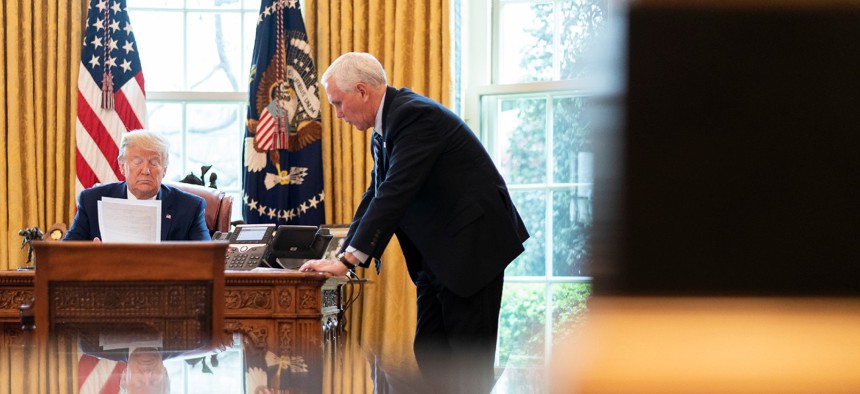
President Trump and Vice President Pence speak to military family members from the Oval Office. Official White House Photo by Shealah Craighead
No, Mr. President, You Can’t Be the Oversight
Trump’s signing statement attempts to preclude the special inspector general for pandemic recovery from reporting directly to Congress, which is anathema to the role of an IG.
As Congress prepared to enact $2 trillion in stimulus spending last week, questions swirled about accountability for the largest spending bill in U.S. history. President Trump declared, “I’ll be the oversight,” in one press briefing. But our system of government was not set up to allow one person to be judge, jury, and executor.
Fortunately, Congress included independent oversight mechanisms in the bill. But President Trump issued a statement that his administration will not comply with a number of the requirements. Mainly, it intends to leave Congress in the dark if administration officials stonewall the inspectors general charged with overseeing implementation. Just as previous stimulus packages had robust independent oversight, this one needs it too. In fact, as the largest economic recovery bill ever passed, it needs to be monitored more rigorously than ever.
The government’s response to the 2008 financial crisis and the ensuing Great Recession provides a good example of the kind of oversight that should be included in the pandemic stimulus bill. Responding to the financial crisis, Congress passed the “bank bailout” including the $700 billion Troubled Asset Relief Program, or TARP.
Did Congress leave it up to the executive branch to ensure TARP funds were spent properly?
No. Instead, it created two oversight panels—one congressional and one made up of economic experts—and a special inspector general. IGs are independent watchdogs charged with promoting “the economy, efficiency, and effectiveness” of federal programs and operations and to prevent and detect waste, fraud, and abuse.
Importantly, IGs report both to the executive branch and Congress about problems, deficiencies, and proposed corrective actions. IGs were created to assist Congress in overseeing the government. Most agencies and departments have an IG. Special IGs are typically created for a discrete purpose, such as the special inspector general for Afghanistan reconstruction.
When the government acted to stem the Great Recession with the 2009 American Recovery and Reinvestment Act, a nearly $800 billion stimulus, it was not careless enough to leave the henhouse unguarded. It created one of the most effective transparency and accountability regimes ever conceived. This included the Recovery Accountability and Transparency Board, led by IGs from across government, and Recovery.gov, which allowed the public to see oversight reports about the act’s implementation. These efforts were immensely successful and a model for government.
Both of these examples were considered when the Bipartisan Policy Center led two expert reviews of government oversight in 2018 and 2019, respectively. These bipartisan panels—composed of former members of Congress, executive branch officials, inspectors general, and senior congressional aides—agreed to multiple accountability and efficiency reforms. Among them: IGs can better inform and report to Congress and IGs from across government should collaborate more to tackle cross-cutting issues.
The COVID-19 stimulus wisely builds on lessons learned from the bank bailout, the Recovery Act, and our reports. The CARES Act created the position of Special Inspector General for Pandemic Recovery and a congressional oversight commission, and it leverages the existing governmentwide council of IGs (CIGIE) to create a Pandemic Response Accountability Committee. The public should be heartened.
If these accountability mechanisms are standard oversight measures, why is the Trump administration bent out of shape?
First, the president’s signing statement discounts the call for the chair of the Pandemic Response Accountability Committee to consult with Congress when selecting staff to lead the committee. He may be right in calling out Congress’ attempt to insert itself in the selection of executive branch staff who do not require the advice and consent of the Senate to fill those positions.
But the second reason—and this is far more troubling—is the administration’s purported plan to prohibit the special IG from reporting to Congress when executive branch agencies stonewall requests for information. Administrations have long been squeamish about IGs going directly to Congress with information that might embarrass the White House. President Trump’s stance, however, undermines the independence and integrity of this new office and Congress’ ability to conduct oversight at a time when the public deserves independent reviews of how this $2 trillion is spent.
To be effective, IG oversight requires that inspectors general have access to agency information and documents. Prior administrations, especially the Obama administration, have resisted this, and Congress has stepped in when IGs brought it to their attention. The signing statement attempts to preclude the SIGPR from reporting directly to Congress without seeking presidential permission. This is contradictory to the role of an independent IG and Congress should make clear that it expects the SIGPR to communicate fully and freely with Capitol Hill. Also, the permanent IG from any agency should report such actions to Congress.
The oversight provisions in the stimulus bill are not designed to personally antagonize President Trump. They are simply the standard measures to ensure accountability in large government spending initiatives.
Undermining them will not help deter fraud or uncover waste and abuse. On the contrary, if President Trump does undermine the effort, he takes on greater responsibility when things do go wrong.
Michael Thorning is Associate Director of Governance at the Bipartisan Policy Center. He was a lead staffer on its Task Force on Oversight and the Inspectors General and Task Force on Oversight and the Executive Branch.
NEXT STORY: Where’s the Money? Keep an Eye on the CARES Act






